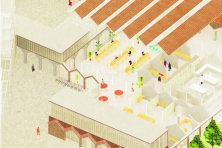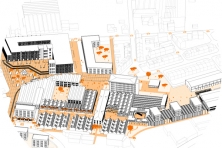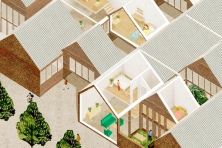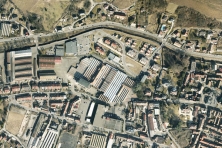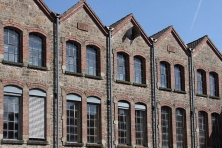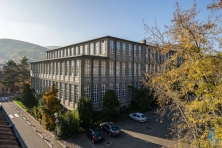Productive Articulations
Guebwiller (FR) - Winner
TEAM DATA
Team Representative: Meriem Chabani (AT) – urbanist architect
Associates: Etienne Chobaux (FR) – architect; John Edom (GB) – architect and anthropologist
45 boulevard de la Chapelle, 75010 Paris (FR)
++33 142 801 367 – contact@txkl.fr – txkl.fr
See the complete listing of portraits here
See the site page here

E. Chobaux, M. Chabani & J. Edom
INTERVIEW
Click on the images to enlarge
1. How did you form the team for the competition?
Our team has been collaborating for the past five years, bringing together three architects with different areas of expertise: construction, urban strategy, and anthropology. We co-founded the studio TXKL in 2016 and the research platform New South.
2. How do you define the main issue of your project, and how did you answer on this session main topic: the place of productive activities within the city?
The central issue of the project ‘Productive Articulations’ is common to many post-industrial sites in European cities: the question of how to transition between a mono-functional area that has lost its relevance to a polyvalent urban fabric integrated within the broader city. Our approach is to focus on very specific urban, programmatic and architectural interventions in order to catalyze and guide the transition of the city and its production.
3. How did this issue and the questions raised by the site mutation meet?
It is the specificity of the city that provides the pivot point for these articulations. The history of Guebwiller, its expertise in textile production and the architectural form that this production itself produced – which constitutes the majority of the existing built fabric on the project site – are the building material upon which the project relies. The principle goal of the project is to provide a highly pragmatic framework for adapting and recycling this material to meet the current and future needs of the city.
4. Have you treated this issue previously? What were the reference projects that inspired yours?
The relationship between production, architecture and urban fabric has been a recurring preoccupation of our practice. Our project ‘Remade in Bangladesh’ explored the relationship between textile production in Chittagong – Bangladesh’s second city and commercial center - and its urban fabric. That project allowed us to explore the flip side of a global economic dynamic that makes production in European cities unviable by favouring cheap, exploitative production practices in developing countries. On a smaller scale, we are also developing the idea of using an architectural project as a means to stimulate local forms of production with the ‘Hôtel des Cèdres’ in Batna, Algeria. For ‘Productive Articulations’, our main inspiration was the Textile Museum and Laboratory in Tilburg, the Netherlands, which combines innovative forms of textile production for current and future applications with a strong emphasis on valorizing the history of the place itself.
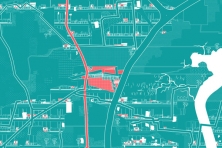
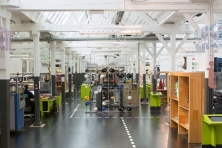
5. Urban-architectural projects like the ones in Europan can only be implemented together with the actors through a negotiated process and in time. How did you consider this issue in your project?
We are well aware that the transformation of such a site can only take place incrementally and through intensive negotiation. As such, the project aims to provide an opening to such a negotiation, and the key project decisions are based upon trying to involve and motivate all the actors concerned by the project, engaging with their strengths and interests. We hope the project provides a strong vision for the future of Guebwiller, but nonetheless one that is flexible, might be implemented incrementally, integrate different, perhaps unforeseen elements and adapt to changes in circumstance over time.
6. Is it the first time you have been awarded a prize at Europan? How could this help you in your professional career?
This is our first Europan prize. We believe Europan offers the opportunity for productive dialog with a variety of stakeholders, and a playground for innovative approaches to urban strategy and research based design.
